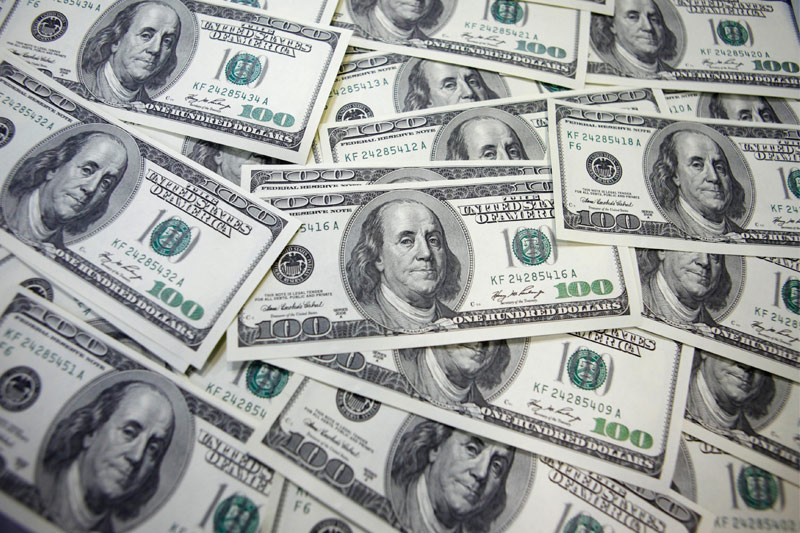Investing.com - The U.S. dollar was mixed against its global counterparts on Wednesday, as dovish comments by Federal Reserve Chairman Ben Bernanke weighed, while the euro remained supported ahead of a meeting of euro zone finance ministers later in the week.
During European morning trade, the dollar was down against the euro, with EUR/USD rising 0.30% to hit 1.3353.
Sentiment on the greenback remained subdued after Fed chief Bernanke indicated earlier this week that U.S. interest rates were likely to remain at current record low levels for a prolonged period while the economy recovers.
The euro found support earlier following upbeat comments by Italian Prime Minister Mario Monti, who said the debt crisis in the euro zone was “almost over.”
Elsewhere, official data confirmed that the French gross domestic product grew by 0.2% in the fourth quarter, in line with preliminary estimates. In contrast, the euro zone economy contracted by 0.3% in the last three months of 2011.
Market participants were looking ahead to a meeting of euro zone finance ministers on Friday, amid speculation that they would agree on a larger debt firewall to combat the debt crisis in the region.
The greenback was higher against the pound, with GBP/USD sliding 0.13% to hit 1.5927.
The pound weakened broadly after official data showed that the U.K. economy contracted by 0.3% in the last three months of 2011, more than the preliminary estimate of a 0.2% contraction.
A separate report showed that the U.K.’s current account deficit narrowed to GBP8.5 billion in the fourth quarter, broadly in line with expectations.
The greenback was lower against the yen and the Swiss franc, with USD/JPY losing 0.33% to hit 82.90 and USD/CHF losing 0.29% to hit 0.9027.
The yen firmed up as Japanese companies moved to repatriate overseas earnings before the end of Japan’s fiscal year on March 31.
Meanwhile, the deputy governor of the Bank of Japan pledged earlier to keep monetary policy “ultra-easy” for as long as necessary to shore up growth and combat deflation.
Elsewhere, the greenback was broadly higher against its Canadian, Australian and New Zealand counterparts, with USD/CAD climbing 0.20% to hit 0.9967, AUD/USD shedding 0.38% to hit 1.0417 and NZD/USD dipping 0.09% to hit 0.8196.
Earlier in the day, the Reserve Bank of Australia’s semi-annual financial stability review said the injection of around EUR1 trillion into Europe's financial system by the European Central Bank had stabilized that region's banks and the global financial system.
The dollar index, which tracks the performance of the greenback versus a basket of six other major currencies, was down 0.14% to hit 79.16.
Later in the day, the U.S. was to produce official data on durable goods orders, as well as government data on crude oil stockpiles.
During European morning trade, the dollar was down against the euro, with EUR/USD rising 0.30% to hit 1.3353.
Sentiment on the greenback remained subdued after Fed chief Bernanke indicated earlier this week that U.S. interest rates were likely to remain at current record low levels for a prolonged period while the economy recovers.
The euro found support earlier following upbeat comments by Italian Prime Minister Mario Monti, who said the debt crisis in the euro zone was “almost over.”
Elsewhere, official data confirmed that the French gross domestic product grew by 0.2% in the fourth quarter, in line with preliminary estimates. In contrast, the euro zone economy contracted by 0.3% in the last three months of 2011.
Market participants were looking ahead to a meeting of euro zone finance ministers on Friday, amid speculation that they would agree on a larger debt firewall to combat the debt crisis in the region.
The greenback was higher against the pound, with GBP/USD sliding 0.13% to hit 1.5927.
The pound weakened broadly after official data showed that the U.K. economy contracted by 0.3% in the last three months of 2011, more than the preliminary estimate of a 0.2% contraction.
A separate report showed that the U.K.’s current account deficit narrowed to GBP8.5 billion in the fourth quarter, broadly in line with expectations.
The greenback was lower against the yen and the Swiss franc, with USD/JPY losing 0.33% to hit 82.90 and USD/CHF losing 0.29% to hit 0.9027.
The yen firmed up as Japanese companies moved to repatriate overseas earnings before the end of Japan’s fiscal year on March 31.
Meanwhile, the deputy governor of the Bank of Japan pledged earlier to keep monetary policy “ultra-easy” for as long as necessary to shore up growth and combat deflation.
Elsewhere, the greenback was broadly higher against its Canadian, Australian and New Zealand counterparts, with USD/CAD climbing 0.20% to hit 0.9967, AUD/USD shedding 0.38% to hit 1.0417 and NZD/USD dipping 0.09% to hit 0.8196.
Earlier in the day, the Reserve Bank of Australia’s semi-annual financial stability review said the injection of around EUR1 trillion into Europe's financial system by the European Central Bank had stabilized that region's banks and the global financial system.
The dollar index, which tracks the performance of the greenback versus a basket of six other major currencies, was down 0.14% to hit 79.16.
Later in the day, the U.S. was to produce official data on durable goods orders, as well as government data on crude oil stockpiles.
